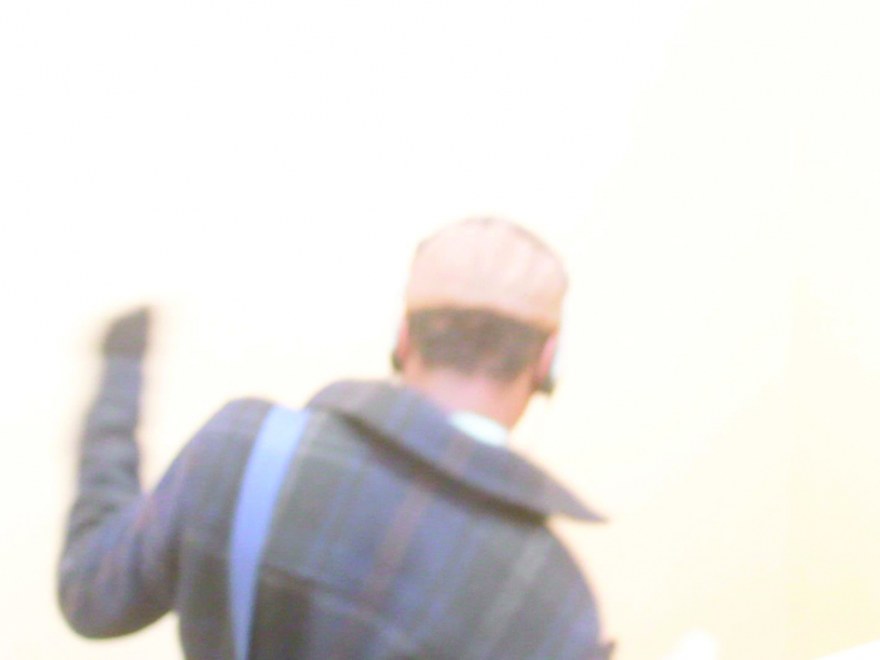Dinner with Printemps
An interview with Jérôme Clément-Wilz, director of Printemps
Printemps appears to be a documentary about the relationship between two men, one of which is speaking in the first person. Is it you?
It is in fact a documentary in the first person, or in two first persons, him and me.
We are both at Clermont to present the film at the Festival. It is about a process of creative liberation, a story told with two voices.
We made these images like the trace of a relationship that was never going to last. We were on borrowed time (but isn’t that the case for all romantic relationships?), we needed to create something concrete from this imprint on our souls. It was only afterwards that we decided to show these images, so that this love would be seen, recognized, eternal.
The last time I showed him this film, he thanked me. This film made him realize and affirm that we had lived something supreme, something beautiful that no one would be able to tarnish or stigmatise. Shooting this film, then editing it, then showing it are stages for both of us on the path of personal acceptance, and of our coming out to others. Living hidden was difficult in the past. Today, it is good for us to dare, to affirm ourselves, to be proud.
These days in France, there is debate over homosexuality. In Printemps, you show that it is often still taboo, and even sometimes considered a crime by certain foreign governments. Why did you choose to focus on the tension generated by the danger of the relationship between the two men? To what point did you consider Printemps as the story of that confrontation?
Fascination is above all the engine of this film, the gentle river flowing between the bedsheets, the interior miracles, the milk baths in the arms of your loved one, warm teeth, sharp laughter, burning showers. The roof of this film is love, or perhaps more passion.
The kind of protagonist doesn’t really matter. What I object to in the term homosexuality is the homo, the same. We were more different from each other than most hetero couples, many of whom are so similar that it would almost make me shiver from incestuousness.
The sword of Damocles is of course present, it has always remained under my roof, tragically announcing the end. The sword is one of the springs in this film, as it was in our relationship; we were attached to it, tragic puppets, happy as clams until the end.
Printemps also shows the ambivalence between the firm intentions and replies of the man who hides his homosexuality in relation to the doubts and questions of the man who has come out. Did you achieve this ambivalence during editing, or was it present from the beginning?
For each person, the process of acceptance both inside and in relation to the different circles of loved ones takes time, and goes through stages, with clarity and doubts. Throughout this process, a documentary film is often a third life-saving eye for the protagonists, a way to say yes, what I am living has value. It aids in understanding and feeling, beyond the ridiculous debates. We waited a year before editing and showing this film. It was essential.
Today, thousands of hours of video are posted on the Internet each day. The term documentary has never been less adequate. Among the snippets of documents, CCTV, Russian Car Crashes and Embedded camera, the fails, the weirdest thing ever, the Go Pros, our role is to re-enchant the world, not by offering a documentary, but a sort of palimpsest, an imprint made to fill an empty space. And above all, to aim for the universal, that which brings us together and makes us dream and discuss.
Making a documentary is an arduous, painful task, especially when it consists of showing your own story, and when the film engages the protagonist to this extent. It is about showing the harsh reality, facing it head on, and to organize the exhibition in gentleness and consultation. This film is there for him, to help us. Summoning the past and using it as a weapon for the future. In his process of coming out, this poetic work can help.
Certain images in Printemps are the product of fantasy, like the ones relating to dance, the image of the athletic body in underwear… Why did you decide to integrate these images in the film?
Love is illuminated by a collection of signs, calls to the world gathered in one frail hand.
In Printemps, we see the director’s obsession with filming. Why did you choose to show this obsession?
We understood right away that the most precious thing in the world must be kept like a jewel. If it isn’t, it can only disappear and be forgotten forever. A desperate gesture to grab the rock that becomes detached from the cliff.
The camera was always present between us. For both of us, there was always a complete understanding of the camera as a writing tool to record our story. The confrontation is in the dialogue, things that one or the other doesn’t want to say, or hear.
With what means did you make Printemps? Did you rely on producers or partnerships? Is this self-produced?
This film was shot and edited alone. When I spoke to François-Pierre Clavel about our story, he accompanied our desire to share this offering.
Printemps is therefore a French production. In your opinion, what does French film production have that the others don’t?
France pisses me off.
It is difficult for me to say in general, but Kidam provides us with a rare freedom and power of language.
Finally, Printemps sublimates the poetry of our daily lives and the passing of time. Do you think Love can conquer all?
For me, love is the engine of the world, and should be for all creation.









